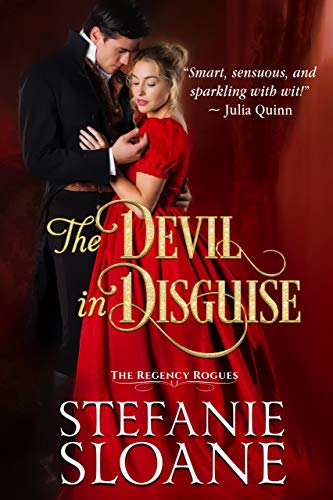The Devil in Disguise
Book 1 in the The Regency Rogues Series
Lord William Randall, the Duke of Clairemont, is a wicked rake with little regard for society—a most unlikely suitor for the prim and proper Lady Lucinda Gray. But his latest assignment for the Young Corinthians, an elite spy organization, involves protecting her from a kidnapping plot and to do this, the notorious “Iron Will” must get close to Lucinda, and convince her that he’s a man worthy of her attention. It is a simple enough task to use his devilish charm to seduce her, but William never would have guessed that he’d become enthralled by the lovely Lady Grey—or that he’d lose his own heart in the bargain.
Beautiful and fiercely intelligent, Lucinda has managed to gracefully sidestep even the most persistent suitors. Until the Duke of Clairemont, that is. His rugged features, sinfully sensuous mouth, and piercing eyes are as alluring as the champion thoroughbred he tantalizingly offers in exchange for the honor of courting her, and she finds it hard to resist either temptation. The feelings he stirs in her both excite and arouse, urging her on despite the very real danger he represents. But when the truth is revealed, will Lucinda risk her heart and her life for a chance at everlasting love?
Please note that this novel was previously published.
Read an Excerpt
The Devil in Disguise
Excerpt
Jump to Ordering Options ↓
Chapter One
April 1811, London
Lady Lucinda Grey had not precisely decided what she would do if the overly eager Matthew Redding, Lord Cuthbert, compared her eyes to the Aegean Sea. Or the most brilliant of sapphires. It had all been said before and—Lucinda admitted with a stab of regret—in much more creative ways than poor Lord Cuthbert could ever dare dream.
“I shall faint, I believe,” she said succinctly, straightening the Alençon lace fichu neatly tucked into her jonquille gown.
Lord Cuthbert stopped ogling Lucinda’s bosom abruptly, a look of confusion clouding his round face. “I beg your pardon?”
Lucinda realized her earnest suitor clearly felt he’d reached the point in his seduction where she should have been dizzy with anticipation and too caught up in the moment to speak.
“Lord Cuthbert, I do apologize,” she offered, taking advantage of the moment to discreetly reclaim her hand from his damp gloved grasp. She slid to the end of the settee, putting two feet of gold damask cushion between them. “Pray continue.”
Lucinda felt compelled to see this thing through, despite the temptation to feign what would surely be a spectacular fainting spell. Lord Cuthbert’s fumbling attempt at romance was, she realized, not unlike happening upon a carriage accident; be it concern or distasteful fascination, one simply could not look away.
Nor faint away, she acknowledged with a frustrated sigh.
Over the last few weeks, Lucinda had acquired far more experience with this sort of thing than she could have ever imagined or wished to endure. The endless parade of suitors who had found themselves on her doorstep this season had been uninspiring, to say the least.
This was all her dear friend Amelia’s fault, of course, Lucinda reflected as Lord Cuthbert droned on. If Amelia hadn’t married the Earl of Northrop last year and if the couple had not displayed a love so wide and vast that those observing wondered if they might very well be lost forever . . . well, Lucinda would not be in this predicament.
A fellow ape leader for the last several seasons, Amelia had, until the altogether unexpected appearance of the earl, been a staunch supporter of a woman’s right to peace. And quiet. And sanity. In other terms, a woman’s right not to marry.
“If only Lord Northrop had not worn Amelia down,” Lucinda muttered under her breath, causing not even the slightest pause from the windbag before her.
Lord Cuthbert was completely absorbed in his rehearsed speech, which left her free to return to her contemplation of the events that had led to his presence in her parlor.
Discreetly counting the winged cherubs that inhabited the plaster ceiling in force, Lucinda begrudgingly admitted that Lord Northrup had not precisely worn Amelia down. Not exactly. That was to say, not at all. On the day the two met it was as if the heavens echoed with the cries of angels—and Cupid himself nearly collapsed from the joy of uniting such a pair.
Uncharitable and unkind, Lucinda mentally chided herself. She adored Amelia as though she were her own sister. To be unhappy over her newfound marital bliss would be inexcusable. And in all honesty, Lucinda was pleased for her friend. It was just that they had both been so convinced that love was a ruse, invented to keep the poets out of trouble. And now one had only to look upon Amelia and her new husband to know that they’d been utterly wrong.
But the real difficulty was that—London being London— Amelia’s blissful state meant that the entirety of polite society assumed Lucinda would follow suit and be felled by love as well.
Frankly, Lucinda found the whole thing somewhat alarming.
And Amelia was no help. Utterly smitten and convinced Lucinda should share her happiness, she had done nothing to defend her friend and dispel the ton’s false assumption. On the contrary, she’d worked feverishly to provide every opportunity for Lucinda to achieve an equally sublime level of bliss. And after countless prospects, all of which had been met with what could be politely called mild disappointment on Lucinda’s part, Amelia had grown desperate.
Which was how Lucinda had arrived at this moment with Lord Cuthbert, forced by good manners to endure his declaration of undying affection.
Cuthbert’s patting of his mud brown hair into place pulled Lucinda from her thoughts. Clearing his throat with theatrical emphasis, he continued his attempts at poetic flattery. “Lady Lucinda, your eyes are, to be sure, the bluest of blues that I’ve ever encountered. Truly, without a doubt.”
She stared at him. She did not know what to say.
He blinked. “Quite blue. Really, truly very blue.”
And in that moment, Lucinda realized that there was only so much a lady of reasonable intelligence could be expected to endure.
“My lord,” she began, rising from the settee and smoothing the fine lawn skirt of her morning gown, “I fear our time together is at an end.”
Cuthbert practically jumped from his seat. He stepped clumsily toward Lucinda, stopping mere inches from her. “Lady Lucinda, are you well?”
It was just the cue she needed. She’d faced much worse from importunate suitors over the last three weeks and hadn’t a doubt her dramatic flair would serve her well in this instance. “I seem to . . . that is to say . . .” She hesitated, swaying ever so slightly while raising her hand to her temple. “I must retire. Immediately, if not sooner.”
Cuthbert seemed to take this latest development as an opportunity, moving to stand unbearably close. He placed his hand at the small of her back. “My dear lady, you must tell me what you need and I will fetch it at once.”
He was determinedly solicitous; Lucinda had to commend him for that. She was going to have to skip to the coup d’etat.
“Lord Cuthbert,” she said, pausing to give what she hoped was a convulsive swallow. “I feel obligated to inform you that I fear I shall cast up my accounts at any moment. And I would so hate to ruin your extremely unique puce waistcoat.”
Cuthbert nearly shoved Lucinda to the settee in his eagerness to escape the baptism. He bounded across the room to reach a small armchair where Lucinda’s maid, Mary, was seated. “Attend to your mistress,” he barked. “At once.”
“My lady,” Mary said quickly, shaking herself from what clearly had been a pleasant daydream and standing.
Lucinda bit back a smile and focused her gaze on Cuthbert. “Thank you, my lord, you’re most kind.”
Clearly his fondness for the puce brocade far outweighed his affection for Lucinda. He backed quickly toward the doorway. “Of course, of course. I’ll call again at a more convenient time.”
Lucinda’s butler, Stanford, appeared with such alacrity it was apparent he’d been waiting just outside in the hall.
“My lord,” the stony-faced butler intoned. His emotionless gaze focused on the gilded mirror just beyond Cuthbert’s large head.
Lord Cuthbert bowed before falling into step behind Stanford.
Mary closed the door quietly.
“He was the worst by far. What on earth could Amelia have been thinking?” Lucinda said, exasperation clear in her voice as she stood.
“That you’ve refused every eligible man in London under the age of seventy?” Mary answered, her years of service to Lucinda evident in her impertinent answer.
Lucinda laughed, Mary’s blunt observance easing the annoyance of the last half hour.
“I do believe Lord Mayborn is actually three-andseventy.” Lucinda said. “And I highly doubt I’ve made the acquaintance of ‘every eligible man’ in the entire city. Surely there are at least one or two more for Amelia to proffer up in her quest for my everlasting happiness.”
“I’ve heard Lord Thorp’s son is available,” Mary answered, peering into the now silent hall before holding the door wide for Lucinda.
Amused, Lucinda arched an eyebrow at her maid’s too innocent expression. “I prefer my men properly attired, which does not include apron strings. And while I do like a good challenge,” she added dryly as she crossed the threshold, “I fear the twenty-year gap in our ages would prove to be an obstacle even I could not overcome.
“Hmph,” Mary said with unshakable calm as she followed her mistress out of the room. “You’ve no romance in you, Lady Lucinda. Not at all.”
“Well, when it comes to infants, I’d have to agree with you,” Lucinda answered over her shoulder as she walked toward the staircase.
Mary hmphed again. “Don’t play coy with me, miss.” Lucinda stifled a grin at Mary’s curt tone. “Oh, Mary. It’s just not true and you know it.”
“Really, now?” the servant answered, the sarcasm somewhat lost in her rough Liverpool accent.
Lucinda mounted the carpeted stairs. “Really,” she confirmed. And it was the truth. She believed in romance as it pertained to the likes of Anthony and Cleopatra, Henry VIII and Ann Boleyn, Arthur and Guinevere, Amelia and John—though the tragic endings of all but her dear friend’s relationship were unsettling, to say the least.
I really must remember to mention this to Amelia, she mentally took note, reaching out to skim the smooth marble balustrade.
The point was, romance was all well and good for others. It simply was not for Lucinda. She did not need a man to make her life complete. Nor did she particularly want one, the emotional upheaval and mercurial behavior that seemed to accompany love something that she neither understood nor desired.
“I’ll have to take your word for it, I suppose,” Mary answered unconvincingly, then gestured for her lady to continue up the stairs, swatting at her derriere when she did so and eliciting a hoot of laughter from Lucinda.
* * *
William Randall, the Duke of Clairemont, bent to nip his mistress’s breast and licked upward to the vulnerable spot where her pulse pounded at the base of her throat. The woman beneath him twisted, panting, her lush curves slick with sweat where their bodies pressed and slid, bare skin against bare skin.
“Harder, Will.” The throaty gasp was half plea, half demand. “Now.”
He could see it in her eyes—the heady mixture of heat, passion, and urgent need that told him that a woman was about to come. Never one to deny a lady, he thrust deeply, ruthlessly holding back his own rising need for release.
“Your Grace. If you please . . .”
“No need to be so polite, Beatrice,” Will muttered before he realized she hadn’t spoken. He bit off a curse and went still, looking over his shoulder.
The ducal bedchamber was cast in gloom, the heavy silken curtains drawn against the afternoon sunshine. Nevertheless, Will instantly recognized his valet’s stiffly erect figure, standing just inside the closed door. “What is it, Smithers?”
Lady Beatrice Winn’s fingers tightened on Will’s forearms, her body stiffening beneath his, and he glanced down at her. Her eyes widened with alarm, chasing away the raging passion of only seconds earlier. Will soothed her concern with a brief, hard kiss. “If you’ll excuse me for one moment,” he began, lifting off of her, “I’ll deliver the sound thrashing that most certainly is in order and return to continue our . . .” he paused, dropping his bare feet to the floor and standing, “discussion of charitable endeavors.”
Beatrice discreetly pulled the sheet up to her shoulders, her mouth sulky with frustration. “Think nothing of it, Your Grace. My charity can wait—though do keep in mind that the longer one is kept waiting, the more needy one becomes.”
He fully understood Beatrice’s warning. She’d proven to be well nigh insatiable in past encounters. “Not to worry. Try to remember where we left off, won’t you?”
Satisfied that she was as comfortable as a mistress might be when interrupted by her lover’s servant, Will reached for his dressing gown and shrugged into it with quick jerks. He roughly knotted the silk tie and turned to his valet. “Smithers, you have my full attention for precisely two minutes. Shall we?”
Will stalked from the room, waiting until Smithers joined him in the hall and pulled the door closed behind them. “Bloody hell, man, do you have any idea how near I was—”
Smithers quickly gestured toward the stairs. “Lord Carmichael awaits you in your study, Your Grace.”
For precisely three seconds, Will held himself silent. And then: “Again you prove yourself unimpeachable, Smithers.”
Will quickened his pace and descended the steps two at a time. “Though you could work on your timing, man. One, two minutes, perhaps, could have been spent in quiet contemplation outside my door, if you understand me?”
“Of course, Your Grace, though Lord Carmichael led me to believe his business with you is of some importance,” Smithers replied from several lengths behind. “Might I bring you a coat, or perhaps breeches?”
Will couldn’t help but grin at Smithers’s undying devotion to propriety, even after many years in his employ. “Not necessary, Smithers. But see to Beatrice. Some tea, perhaps?”
“Of course, Your Grace,” Smithers said instantly. Barefooted, Will strode down the hall on the second floor and turned left into his study, slamming the heavy wooden door behind him. Much to his frustration, the sound failed to elicit even the slightest arching of an eyebrow from the man sitting behind his desk.
“You really should have taken Smithers up on the breeches, Clairemont,” Henry Prescott, Viscount Carmichael, said dryly, his eyes never straying from Will’s. Damnation, the man can’t be surprised. Will sat down and carefully arranged his dressing gown. “Come now, Carmichael. Clothing can be an impediment in certain situations. If I had known to expect you, then perhaps other arrangements could have been made.”
“It’s three o’clock in the afternoon. Surely ‘other arrangements’ could have, and should have, been made with regard to your games above-stairs. Won’t her husband wonder where she’s gone off to?”
Will returned Carmichael’s halfhearted reproach with a smile. “You know very well Winn is likely as not foxed by now. And even if he wasn’t, he couldn’t care less about Beatrice. Which is why she’s the ideal woman for me. I really should be thanking the fellow, come to think of it.”
Carmichael quirked a brow and said nothing, which Will found highly annoying. “Are we done making comment upon my personal exploits?”
Carmichael looked as if he might smile. “Quite.”
“Excellent.” Will shifted his position, careful to keep a hand on the disobedient gown. “Now, old man, tell me, are you here on Corinthian business or were you simply anxious to see me?”
Will was a member of the Young Corinthians, a clandestine spy organization that operated deep within the British government. Carmichael led the elite force with an iron fist, managing the many lords in service with skilled precision.
Carmichael smiled at the reference to his age, no more than half a dozen years separating the two. “Very well, on to business.” He stood, his wiry frame taking little time to unfold. “We’ve received intelligence from several reliable resources in France regarding a kidnapping plot about to be put in play.”
“And the target?” Will leaned forward, instantly focused on the threat, their conversation about his mistress forgotten. “Princess Caroline, perhaps?”
“No,” Carmichael answered as he started to pace. “No, the goal is money, but this time the target is a wealthy young woman. More specifically, the wealthiest woman in England.”
Will frowned as he began a mental check of who that might be. Despite his own family’s social significance, he paid little attention to such things, and identifying the chit presented a challenge. “You’ll have to give me a clue, here, old man. I’m afraid my years spent cultivating a rake’s reputation have hardly left me on intimate terms with the ton’s wealthiest debutantes.”
“Lady Lucinda Grey,” Carmichael answered, stopping just in front of the mullioned window. “Daughter of the late Earl of Sinclair. Of course, the title now belongs to a great uncle. But Lady Lucinda inherited a fortune in unentailed property from her father. Not to mention a town house and other bits and baubles from her mother.”
Will let out a low whistle of appreciation.
“Do you know her?” Carmichael inquired.
Will relaxed into his chair, stretching his long legs out in front of him and crossing them at the ankles while still managing to remain decently covered by the gown. “Lady Lucinda Grey? Only by reputation, Good Lord, from what I’ve heard of her, the kidnappers should be fearful. Beautiful, charming, and intelligent enough to deny thousands of men the honor of her hand for nearly a decade. Lady Lucinda will have her captors enthralled in no time.”
“Perhaps. But I’m afraid we can’t count on her charms and ability alone,” Carmichael began. “Fortunately for our purposes, she’s apparently looking for a husband this season.”
Carmichael paused, and he looked at Will as if he ought to know what the hell he was talking about.
“This is where you come in,” he finally added. Will straightened and tried to look into Carmichael’s face. But the old man was standing with his back to the window, and his face had been cast into shadow, making it difficult to read his expression.
Will cleared his throat and began carefully, choosing each word with the same precision he reserved for his work. “I’m not sure I understand, especially in light of our conversation a few moments ago. I’ve spent years cultivating a reputation guaranteed to make the ton believe I’m an irredeemable rake. It’s been an excellent cover. I’m the last man anyone would believe to be looking for a wife, never mind the richest, most sought-after woman in all of England.”
“Your reputation is an impediment in this instance, I’ll admit. But you are, after all, the best actor among all the Corinthians, are you not?”
Will leaned a bit to the right but, much to his frustration, still couldn’t see Carmichael’s face clearly. “Flattery will get you nowhere, old man. Besides, why not hedge your bets and use someone who actually has a prayer of breathing the same air as Lady Lucinda? Talbot or Wharton would be perfect. They’re such, such . . .” He waved a hand, searching for the appropriate term.
“‘Gentlemen’ is the word I believe you’re looking for.” Will shifted to the left but still could not see Carmichael well. “Yes, gentlemen, or in other words, men who would be allowed within ten paces of the woman. Unless it is your intention to terrify the chit. One look at me and she’d succumb to a fit of the vapors.”
“Oh, but you have something that no other man in England has,” Carmichael said with calm conviction. “And it’s something she desperately wants.”
Will stood and walked to the fireplace, where he leaned his forearm on the mantel. “What could I possibly have that Lady Lucinda Grey would desire?”
He had a clear view of Carmichael now and easily read the satisfaction on the man’s face.
“King Solomon’s Mine.”
Will was confused. “Why would the richest woman in all of England want my horse? She could buy a stableful of champions.”
Carmichael moved around the desk to stand in front of Will. “King Solomon’s Mine, as you well know, was bred in Oxfordshire on the Whytham estate, which borders Lady Lucinda’s Bampton Manor.”
“But why would a woman want a horse merely because he was bred next door?”
“You know women. They’re softhearted creatures with minds of steel. And once those minds are made up . . . well,” Carmichael shrugged, “there’s little that can be done to change them. Our intelligence tells us Lady Lucinda was present at King Solomon’s Mine’s birth and she spent much time thereafter with him. Apparently, she developed a fondness for the colt and considered him her special project. That is, until you won him.”
Will had a brief, swift flash of memory. The look of sheer disbelief on Whytham’s face when he realized he’d lost the son of Triton’s Tyranny had made it a truly unforgettable hand of cards.
“That’s all well and good, but what does my owning the horse have to do with Lady Lucinda allowing me into her company?”
“Rumor has it she enjoys a challenge,” Carmichael answered. He glanced at his engraved watch and frowned before abruptly tucking it back into his waistcoat pocket. “You’re a resourceful man. I’m sure you’ll think of something.”
Carmichael’s tone worried Will. He’d known the man too long to be fooled by his seemingly casual words. “Surely you don’t expect me to offer her Sol in a wager of some sort?” He didn’t add he’d rather lose a limb than the stallion. The comment would only serve to confirm Carmichael’s suspicion that Will had a much softer heart than he would ever admit.
“As I said, you’re a resourceful young man.”
Will would have pressed further, but the look on Carmichael’s face stopped him cold. “There’s something you’re not telling me. Come now, old man, what is it?”
“It’s Garenne.”
Will froze. “What do you mean?”
“He’s involved.”
“No.” Will shook his head, refusing to believe it.
“That’s impossible. He’s dead. I saw the body with my own eyes.” The night the Corinthians had taken the French assassin down on a nondescript Parisian street was seared into his memory. The organization had breathed a collective sigh of relief with the death of Garenne.
Carmichael cleared his throat. “What was it you called him—the Chameleon?”
“He had a gift for disguises, that much is true,” Will said brusquely. “But the man’s size, his clothing . . .” He wanted to convince Carmichael, wanted to convince himself. “We received intelligence. It guaranteed that we had the right man.”
“We’ve confirmed sightings of him in Paris,” Carmichael said quietly. “And two recent killings of Corinthians involved his calling card.”
Will felt his stomach roil at the thought of Garenne’s signature. The sadist left each of his victims with a fanciful letter “G” carved into his left breast, the knife strokes revealing the victim’s heart, left exposed by the crude cuttings of a madman.
Will flexed his hands before curling them into fists, slamming one and then the other onto the polished top of the massive oak desk.
“He’s rumored to be working for Fouché,” Carmichael added.
“Napolean must be trying to stick his bloody fingers in every pie on the Continent,” Will said tersely.
“I’m afraid keeping up with Joseph Fouché’s political loyalties is an exhausting task indeed,” Carmichael answered. “No, it seems the man now supports the House of Bourbon. They’ll stop at nothing to secure control of the Continent—perhaps England as well.”
Will looked up at Carmichael, whose brows were knit together in concern. “I suppose you’ve a starting point for me, then?” he said, carefully resuming his air of insouciance.
Carmichael took a pasteboard card from his breast pocket. “I suggest turning yourself over to Smithers. The Mansfield ball is this evening and we’ve confirmed that Lady Lucinda will be in attendance.” He offered the invitation to Will and walked to the door, pausing to look back. A wry smile tilted his mouth as his gaze flicked to Will’s bare toes and back up to his face. “A shave might be in order. She likes her suitors properly turned out. And breeches. Do not forget the breeches.”
Will moved to the window and looked out at the garden. The sight of hyacinths, pansies, and a whole host of other flowers that he could not name did little to soothe the growing doubts in his mind. Corinthian business was never a neat and tidy affair. Subterfuge demanded an often skewed view of right and wrong—something that had heretofore suited Will’s less-than-traditional view of life.
It’s not as if I’ve never lied to a woman before, he thought as he turned from the window and rested his shoulder against the heavy velvet curtain. It wasn’t something he was proud of, but to live as he did and to be an effective agent for Carmichael often made the truth more dangerous than any lie ever could be.
No, it wasn’t the lie that bothered him, but perhaps the intent. To court a woman for the entire ton to see—Will paused mid-thought, nearly shuddering as he steadied himself before crossing to his desk. For a man to engage in a series of activities with the believed goal to be matrimony . . . Well, that was a different animal altogether.
Carmichael had spoken the truth when he reminded Will of his expert acting skills. He picked up a cutcrystal paperweight and addressed it in Hamlet-like fashion. “The woman doesn’t stand a chance.”
Will knew it. Carmichael knew it. The only individual involved in their scheme who was ignorant of this fact would be Lady Lucinda.
Gently replacing the weight to its proper place, Will straightened his dressing gown and reknotted the silk sash. Could he win the heart of an honorable woman? Could he do so with the knowledge that he would, in the end, break it?
Of course he could. A man in his position couldn’t afford a conscience. Why his conscience had chosen this particular moment to come to life, he didn’t know.
In truth, to leave the woman to the likes of Garenne was unthinkable. He’d rather slit his own throat than allow the madman another chance to kill. “Bloody hell,” Will swore, padding across the thick Turkish rug with a newfound resolution. “It’s the horse that has me worried,” he said to no one in particular as he opened the door. “He really is a fine horse.”
end of excerpt
The Devil in Disguise
is available in the following formats:

Digital:
Print:
- Sorry, this title is not available in printed formats














